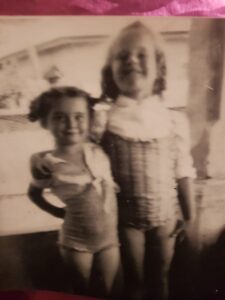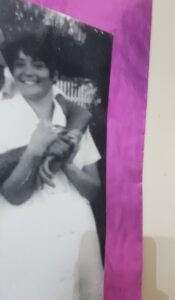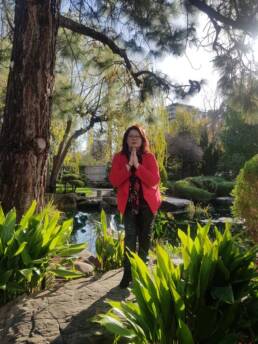These life stories may contain descriptions of childhood trauma and abuse, as well as images, voices and names of people now deceased. If you need help, you can find contact details for some relevant support services on our support page.
Long-time South Australian activist, Priscilla Taylor (b. 1952), was in a children’s home, foster care, and a group home as a child.
Priscilla McMorron was born at the Queen Elizabeth Hospital in Adelaide. Priscilla’s mother, Phyllis McMorron, left her violent second husband, Priscilla’s father, when she was pregnant with Priscilla. She took her first child, Mary, and went to stay at the Fullarton Women’s Refuge, also known as St Joseph’s Refuge.
It was run by Catholic nuns and the women who stayed there worked in the laundry. After I was born, my mother returned to the refuge and we stayed there until I was two years old (Taylor, Life Stories).

From then, Priscilla’s sister, Mary, was taken to stay with relatives while Phyllis took Priscilla with her to Millicent where she had employment as a live-in housekeeper.
The government came and took me, promising my mother that when she was settled in her work that myself and my sister would be returned to her care. She was also paying for us to be looked after in state care during this time. But we were never returned to her care despite what they promised. I remembered my mother telling us that they had lied to her (Taylor, Life Stories).
Over the next fifteen years, Priscilla’s mother was rarely allowed to see her daughters, needing to seek permission in writing before she could occasionally visit “in a glass office for an hour” at Seaforth Home. Phyllis, did, however, send birthday gifts and when Priscilla was a teenager, she gained permission from the Attorney-General to have the girl stay with her for a week.
During her time in state ‘care’, Priscilla was moved something like sixty times between foster care placements, back to Seaforth, and finally to a group home.
The movements were emotionally and psychologically disturbing, especially since Priscilla had been cruelly sexually and physically abused in the first foster care placement and was terrified of being placed back into that situation again.
Priscilla left school at age fifteen and, while the then Department of Social Welfare assisted with finding accommodation with the very nice “Mr and Mrs Jones in a granny flat at the back of their house” (Taylor, Life Stories), there was no encouragement to resume and extend her education.
When Priscilla was seventeen, she gave birth to a son who was quickly taken from her.
I cried and cried when I left the maternity home. I did later meet my son when he had his first son, my first grandson. He and his wife moved down from Queensland to Adelaide to meet me and his two brothers (Taylor, Life Stories).
Because she was still a state ward and had been forced to give up her first son, Priscilla gave evidence to the federal government inquiry into forced adoptions and attended the National Apology given by then Prime Minister, Julia Gillard, on 21 March 2013.
Priscilla has suffered tremendously because of her childhood experiences. She also worked for more than thirty years, bought her own house, and raised her two younger sons.

For more than thirty-five years, Priscilla has been an activist on behalf of herself and others who were abused while in the ‘care’ of the state.
She began writing to journalists and politicians back in the 1980s with only a response from High Court judge and activist, Sir Ronald Wilson (1922-2005), for her efforts.
In his letter to me, he stated that it was good that this information about Australia’s history was being exposed, ‘but the government would not take our plight seriously being cash strapped’ (Taylor, Life Stories).
Priscilla Taylor was a key player in the call for a state government inquiry, which eventually resulted in the “Children in State Care Commission of Inquiry into children who were sexually abused while in state care”—known as the Mullighan Inquiry—and which ran from 2004 to 2008. In response, the South Australian Government formally apologised to those who had been abused while in the ‘care’ of the state on 17 June 2008 and Priscilla was a member of the survivors’ group consulted for the wording of the apology.
Through the Mullighan Inquiry, Priscilla came to hear about CLAN (Care Leavers Australasia Network) and she took up the role of social coordinator for CLAN in South Australia for five years. Priscilla has now been a member of CLAN for fifteen years.
This year Leonie [the president of CLAN] lobbied with a matter for myself. With her strength, care and experience and hard work the outcome was reversed within days. I love Leonie’s company and her humour and that would be why Leonie had a yellow and blue sash made for me which says, Miss CLAN 2018, because of my support for CLAN (Taylor, Life Stories).
Earlier, Priscilla had given evidence to the 2002-2004 federal Senate Inquiry which resulted in Forgotten Australians: A report on Australians who experienced institutional or out-of-home care as children and she attended the 16 November 2009 Apology given by then Prime Minister, Kevin Rudd.
Priscilla also worked as a member of the Reference Group for the Alliance for Forgotten Australians (AFA) for fourteen years. She acted as proxy for the South Australian member, David Jackson, for six years, and trained to become a Forgotten Australian Ambassador.
Priscilla was also involved in organising the Forgotten Australians memorial in Peace Park, North Adelaide. Designed by visual artist Craige Andrae, the memorial consists of four giant stainless steel yellow daisies—the tallest being over six metres—in different stages of opening. The launch was held on 17 June 2010 in recognition of the South Australian government apology two years previously.
Our memorial is very grand. But as we have so little to represent our past history and trauma, being grand is fitting as it has so many of us 450,000 to support our healing. Our memorial holds great significance to us. Therefore, when we have important events, we attend our memorial and have even laid wreaths there (Taylor, Life Stories).
As well, Priscilla has been involved in organising anniversaries of the State and Federal government apologies, and was an active member of Elm Place’s—a support service for Forgotten Australians resulting from the state and federal inquiries—reference group for fourteen years.
In 2011, Priscilla co-edited a collection of stories by people who had been in the care of the state, Recipes for Survival: Stories of Hope & Healing by Survivors of the State ‘Care’ System in Australia.
She has also been keen to participate in university research and was a state member of the Consumer Research Group for the Find & Connect web resource project and promoted a national study into the long-term outcomes of Forgotten Australians in 2015.
In 2019, Priscilla was one of twenty participants in a project undertaken by Sydney based freelance human rights photographer, Belinda Mason. The Taken – forget us not multi-media exhibition includes the following:
The sisters were told their mother didn’t want them, but Priscilla’s files revealed a very different story. Even the courts denied them. The letters [Phyllis] wrote to her daughters were returned unopened by the institution that held her children. These letters were found in a box under her bed when she passed away. Sadly, she died of a heart attack at 50 years old and without ever meeting her daughters as adults.
Priscilla Taylor has continued her activism at federal level and most recently has been involved in “Helping Hand’s Aged Care’s Real Care the Second Time Around Project” (funded by the Australian government).
Aged care is very important to us as we don’t want to be abused and neglected again in institutional care (Taylor, Life Stories).
Priscilla became a member of the Steering Committee for the Real Care the Second Time Around Project and was nominated for a carer community achievement award in 2019. She was one of five finalists chosen from 400 nominations.
Priscilla Taylor has also been participating with the Centre of Democracy, run by the History Trust of South Australia, on a project to ensure that Forgotten Australians are included in South Australian history.
We soon found out that the South Australian [Centre for Democracy] had every group of people except us, non-Indigenous Forgotten Australians, included in a timelines. So, I wrote a South Australian timeline (Taylor, Life Stories. The timeline is included below).
The various government inquiries Priscilla has campaigned for have marked a turning point in her own life. Until the South Australian inquiry, she had never spoken of the abuse and disruption she had experienced.
“I just kept on trying to get through life. I didn’t tell of the abuse, didn’t have the opportunity until the age of 54, during the Mullighan inquiry,” she said.
“Until you speak about it, I honestly believe that you cannot move forward and try to begin to heal…
“I have been able to move on to a certain degree. I have a good relationship with my sons now and my two grandsons” (Taylor cited by ABC Radio).
Priscilla Taylor’s Timeline for South Australian Forgotten Australians/Care Leavers
Pre 1920s: institutional and foster care
1930: Religious organisations began and others with government assistance
1930-1939: Great Depression
1939-1945: World War 2
1970-1980s: Most large institutions closed
1991: First National Child Protection Council was established in Australia
2000: CLAN the first support service was established by two care leavers, Joanna Penglase and Leonie Sheedy.
2004: Forgotten Australians: A Report on Australians who experienced institutional or out-of-home care as children.
2005: Families SA Support Service for Forgotten Australians set up
2008: Mullighan Inquiry was tabled in SA Parliament. It investigated allegations of sexual abuse of children in state care.
2008: National Alliance for Forgotten Australians was set up.
2009: Lost innocents and Forgotten Australians revised by the Senate Community Affairs References Committee. Class action compensation by Duncan Basheer Hannon.
2010: Memorial Launch in Peace Park.
2012: National Library of Australia documents oral history of Forgotten Australians.
2011-2013: Find & Connect website launched in 2011. A redesigned site launched in 2013.
2012: INSIDE travelling exhibition launched.
2012: 2017: Royal Commission into Institutional Responses to Child Sexual Abuse.
2015: Acknowledgement of unmarked graves in West Terrace of children in instititional care.
2018: Change of statute of limitation – time limitations were removed on all forms of child abuse.
2018: National Apology to victims and survivors of Institutional Child Sexual Abuse.
2018-2019: RASA Aged Care.
2019-2029: National Redress Scheme to support people who experienced institutional child sexual abuse.
2019 – hopefully ongoing: Real Care Second Time Around through Helping Hand Care made a submission to Royal Commission Aged care Quality and Safety.
References:
Alliance for Forgotten Australians https://forgottenaustralians.org.au/
Australian Government. “National apology to Forgotten Australians and former child migrants.” Department of Social Sciences, Australian Government, 2009. https://www.dss.gov.au/our-responsibilities/families-and-children/programs-services/apology-to-the-forgotten-australians-and-former-child-migrants
Australian Government. “National Apology for Forced Adoptions.” Attorney-General’s Department, Australian Government, 2013. https://www.ag.gov.au/families-and-marriage/national-apology-forced-adoptions
“Children’s Welfare and Public Relief Department (1927-1966).” Find & Connect, 2022. https://www.findandconnect.gov.au/ref/sa/biogs/SE01100b.htm
CLAN (Care Leavers Australasia Network). https://clan.org.au/
Community Affairs References Committee. Forgotten Australians: A Report on Australians who experienced institutional or out-of-home care as children. Commonwealth of Australia, 2004. https://www.aph.gov.au/Parliamentary_Business/Committees/Senate/Community_Affairs/Completed_inquiries/2004-07/inst_care/report/index
“Department of Social Welfare (1966-1970) South Australian Government.” Find & Connect, 2018. https://www.findandconnect.gov.au/guide/sa/SE00071
Elm Place. https://elmplace.org.au/
Find & Connect. https://www.findandconnect.gov.au/
“Forgotten Australians.” Helping Hand. https://www.helpinghand.org.au/about-us/diversity-inclusion/forgotten-australians/
“Foster care and institutional abuse study: Former state ward Priscilla Taylor urges others to share stories at Adelaide forums.” ABC Radio Adelaide, 7 September 2015. https://www.abc.net.au/news/2015-09-07/foster-care-abuse-national-study-priscilla-taylor/6755112
Mason, Belinda. “Denied.” Forget Us Not, 2019. http://forgetusnot.com.au/
Michell, Deidre and Taylor, Priscilla. Recipes for survival: Stories of Hope and Healing by Survivors of the state ‘care’ system in Australia. Elizabeth, South Australia: People’s Voice Publishing, 2011.
Mullighan, E.P. Children in State Care Commission of Inquiry. State of South Australia, 2008. https://www.childprotection.sa.gov.au/__data/assets/pdf_file/0011/107201/children-in-state-care-commission-of-inquiry-introducation.pdf
“Seaforth Home (1946-1975).” Find & Connect, 2022. https://www.findandconnect.gov.au/guide/sa/SE00354
“South Australian Apology to Child Victims of Child Abuse while in State Care (17 June 2008).” Find & Connect, 2022. https://www.findandconnect.gov.au/ref/sa/biogs/SE01666b.htm
“St Joseph’s Refuge (1868-2001).” Find & Connect, 2019. https://www.findandconnect.gov.au/guide/sa/SE00042
Taylor, Priscilla. From Pain to Purpose. Life Stories Project, Alliance for Forgotten Australians, 2021.
Images supplied.
